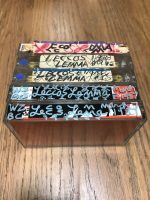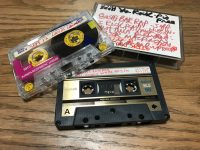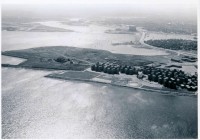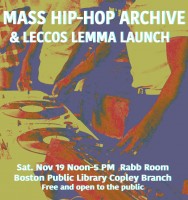Guest post by Gayle Schechter

Show tapes from the Lecco’s Lemma show (writing by Willie Alexander).
Not many people are required to listen to hip-hop at their jobs, but for the past few months as a University Archives and Special Collections intern in the Joseph P. Healey Library at the University of Massachusetts Boston, listening to hours of freestyles and beatboxing has all been part of a typical day’s work. Tasked with processing recordings of radio broadcasts from the Lecco’s Lemma collection, part of the Massachusetts Hip-Hop Archive, I’ve not only gained valuable experience with digital collections, but also gotten a crash course in the history of Boston hip-hop. The Lecco’s Lemma collection chronicles an era when hip-hop in Boston was still in its infancy, and when you would record your favorite songs off of the radio instead of searching for them on YouTube.
The Lecco’s Lemma collection contains recordings of radio broadcasts of Lecco’s Lemma, a local hip-hop program hosted by Magnus Johnstone from 1985-1986 on MIT’s WMBR and from 1986-1988 on Boston College’s WZBC. Along with nearly 200 audiocassettes of Lecco’s Lemma broadcasts, the collection also contains more than 200 demo tapes from area hip-hop artists sent to Johnstone to be played on air. In addition to airing local artists, those familiar with old school hip-hop would recognize many of the artists played on broadcasts of Lecco’s Lemma, from Boston-bred Gang Starr to New York City’s Run D.M.C. and the Beastie Boys. The digitized recordings are available online here.

Show tapes from the Lecco’s Lemma show (writing by Willie Alexander).
While the Lecco’s Lemma collection provides a window into Boston’s underground hip-hop scene of the 1980s, the unique nature of the recordings created a number of issues to be considered by University Archives and Special Collections staff. Many of the recordings contain explicit language, necessitating content warnings for our digital collection. The do-it-yourself nature of recording demo tapes often meant artists would take commercially-released cassettes and dub their recordings over the originals. While one side of the tape may contain original beatboxes and rhymes from a Boston crew, the other side could contain half of a Donny Osmond album.
Cassette recordings of the Lecco’s Lemma radio program are not official recordings, but rather were created at home by Boston punk rocker Willie “Loco” Alexander, who recorded them off the radio on his boom box. One broadcast of the show can span a number of cassettes, and many cassettes contain portions of episodes recorded on different days creating instances where one object has more than one date associated with it.
Despite the challenges that the Lecco’s Lemma collection has presented, it’s been an honor to help preserve the history of hip-hop. Though the story of hop-hop in Boston has in many ways remained a well-kept secret, the Lecco’s Lemma collection shows that hip-hop artistry was very much alive and thriving in Boston during the 1980s.
Explore the Lecco’s Lemma digital collection online here.
Read more about the Massachusetts Hip-Hop Archive here and keep visiting blogs.umb.edu/archives for future updates.
Gayle Schechter is an M.S. candidate from Simmons School of Library and Information Science.
University Archives & Special Collections in the Joseph P. Healey Library at UMass Boston collects materials related to the university’s history, as well as materials that reflect the institution’s urban mission and strong support of community service, notably in collections of records of urban planning, social welfare, social action, alternative movements, community organizations, and local history related to neighboring communities.
University Archives & Special Collections welcomes inquiries from individuals, organizations, and businesses interested in donating materials of an archival nature that that fit within our collecting policy. These include manuscripts, documents, organizational archives, collections of photographs, unique publications, and audio and video media. For more information about donating to University Archives & Special Collections, click here or email library.archives@umb.edu.






